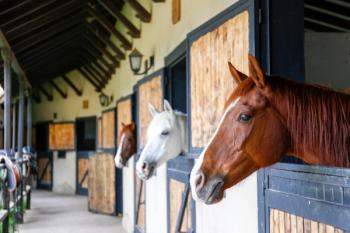
Should a veterinarian's work relationships be formalized?
This month, we begin a series covering a particularly relevant topic in veterinary law, yet one that is widely overlooked both by lawyers when they are counseling veterinarians and veterinarians as they seek out legal advice.
This month, we begin a series covering a particularly relevant topic in veterinary law, yet one that is widely overlooked both by lawyers when they are counseling veterinarians and veterinarians as they seek out legal advice.
The articles will discuss what may well be the most important aspect of the veterinarian's contact with the legal world: should a doctor's work relationships be formalized?
As any seasoned businessperson will tell you, the personalities of business owners and workers, the interplay of those personalities and the development of interpersonal relationships are every bit as important to success as is the business' product.
'Relationship thing'
Veterinarians may be aware of the importance of these factors as they relate to, say, the doctor-client-relationship, but few seem to grasp just how vital a role the "relationship thing" plays in the work and career environment.
In the areas of associate-owner, owner-owner and new partner-existing partners interplay, relationship development is crucial. More importantly, the establishment of the work relationship boundaries needs to be addressed at the earliest possible time. This is how hurt feelings and economic catastrophes are avoided.
For example, I have associates call my office and tell me stories like this: "I signed an employment contract six months ago and at the time my boss seemed like such a jewel. Shortly after I signed, he became a tyrant. I'd like to leave, but the contract says I can't go for a year."
Case in point
Partners call me and relay tales such as this: "Five years ago we just started practicing together as partners and after that time the practice has really taken off. But now my partner has begun rolling in at 10:30 and leaving at 4 p.m., but still is taking the same draw."
It's not much simpler at big practices.
Dr. K called me a while back and said, "One of the other associates just married the office manager, and now I get all the worst holiday emergency hours. The owners tell me just to work it out, but my employment agreement doesn't specify what hours I get."
It would be almost impossible for me to overemphasize the degree to which such personality clashes and the resultant disputes and resentment contaminate the animal clinic work environment.
Polluted environment
I've witnessed the phenomenon as an employed veterinarian, as a practice owner, and especially as a veterinary attorney.
How then can the many different personalities in the veterinary profession be reconciled as contractual and other legal bonds are entered into? What can professionals generally, and veterinarians specifically, do to avoid interpersonal disputes, internalized resentment and professional disappointment?
I believe that solutions can be found in a two-step combination:
Finding solutions
- First, professionals need to practice objective practicality. That is, they need to step back and realistically appraise their own agenda and attempt to identify the agendas of others.
- Second, doctors should insist that sufficient, (but not excessive) detail be identified and formalized within their business relationships to account for changing circumstances and the pursuit of the relationship's goals.
Perhaps a useful example can be found in the practice of law in which professional relationships have been developed and renegotiated countless times over the centuries.
In a large firm, associates are widely recognized by their employers (and indeed by themselves) as moderately-compensated serfs who toil endlessly for the economic benefit of the organization of experienced attorneys. However, there is an implicit understanding that this hard work and sacrifice will be assessed within a finite period of time.
In a big law firm, if the legal associate has worked hard, developed professionally and played office politics with reasonable skill, he will become a senior associate and eventually a partner in that firm between four to nine years. Large law firms are often "up or out" organizations. This means that if an associate fails to perform, he will remain an associate or be discharged; though if he does perform, the economic and social rewards of partnership will be his within a reasonably ascertainable time frame.
By comparison, veterinary hospitals, including many quite large ones, leave the associates in semi-limbo status for a nearly indefinite period. The practice owner(s) many times avoid the subject of premiership (or for that matter, long-term associated). Meanwhile, an associate may be too timid to ask about partnership. She may even be perpetually uncertain as to whether the commitment of partnership or ownership is actually what she wants.
The situation among partners isn't much different. Oftentimes, two or more experienced doctors (who usually start out as friends, but who don't stay that way very long) will pool capital and effort to open a veterinary practice with a loosely-knit partnership arrangement.
These veterinarians can see an economic opportunity in practicing together, but never "get around" to establishing any more about the economic relationship than an agreement to split the profits. By ignoring the details of their relationship at its beginning, these partners are nearly condemned to a bitter dispute later when circumstances change and each party's position has become entrenched.
I would like to offer some general observations for veterinarians to consider in making their career choices and developing their business and professional associations with bosses, partners, other associates (and for that matter, the spouses and paramours of each of those categories of people). I believe the following points are true:
- It takes several years to fully appreciate the true agenda and motivators of a person in a business/professional relationship.
- The degree of legal/contractual commitment between parties should be based on the recognition that circumstances change and that they usually change unexpectedly.
- While it is important to try to identify the goals of your partner/associate/fellow associate, it is more important to objectively identify your own motivations and goals (to the extent that they are currently identifiable).
- It is in all parties' best interest to identify potential future issues and problems and address them early in a professional relationship rather than to wait until one of those problems unfolds and the relationship becomes a "salvage operation."
- Last, and most importantly: People do not change unless they are very highly motivated to do so.
In the second installment of this series, we will discuss the most common issues of uncertainty that make it so very difficult for veterinarians to assess their own goals and to objectively hypothesize concerning the agendas of others. In the third and final article, there will be a discussion of just how detailed specific workplace relationships need to be. It will also review another essential matter: How to avoid letting an attorney damage or ruin a veterinarian's business relationship by "overlawyering" a contract, a buy-in deal or even an emergency schedule.
Newsletter
From exam room tips to practice management insights, get trusted veterinary news delivered straight to your inbox—subscribe to dvm360.






